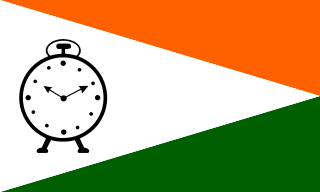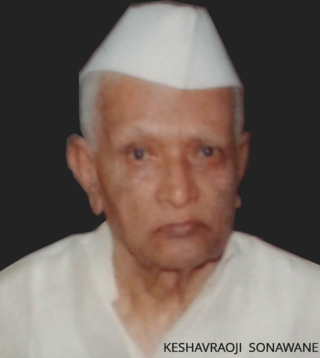
The Indian National Congress (INC), colloquially the Congress Party or simply the Congress, is a political party in India with widespread roots. Founded in 1885, it was the first modern nationalist movement to emerge in the British Empire in Asia and Africa. From the late 19th century, and especially after 1920, under the leadership of Mahatma Gandhi, the Congress became the principal leader of the Indian independence movement. The Congress led India to independence from the United Kingdom, and significantly influenced other anti-colonial nationalist movements in the British Empire.

Sonia Gandhi is an Indian politician. She is the longest-serving president of the Indian National Congress, a social democratic political party, which has governed India for most of its post-independence history. She took over as the party leader in 1998, seven years after the assassination of Rajiv Gandhi, her husband and a former Prime Minister of India, and remained in office until 2017 after serving for twenty-two years. She returned to the post in 2019 and remained the President for another three years. Following more than 2 decades serving in the Lok Sabha, Gandhi retired from the lower house in 2024 and was elected to the Rajya Sabha the same year.

Rahul Rajiv Gandhi is an Indian politician and a member of the Indian Parliament, who represents the constituency of Wayanad, Kerala in the Lok Sabha. He previously represented the constituency of Amethi, Uttar Pradesh. He is a member of the main opposition party, the Indian National Congress and was the party president from December 2017 to July 2019. He is the chairperson of the Indian Youth Congress, the National Students Union of India and a trustee of the Rajiv Gandhi Foundation and Rajiv Gandhi Charitable Trust. He is the son of the former Prime Minister of India, Rajiv Gandhi.

The Nationalist Congress Party is one of the state parties in India. The party generally supports anti-communalism and Gandhian secularism. It is one of the major political parties in Maharashtra, Nagaland and Kerala. In July 2023, majority of the elected MLAs and MLCs of the party led by Ajit Pawar joined the National Democratic Alliance government, however, all MPs except two are expected to remain loyal to Sharad Pawar. This caused a direct split between the Ajit Pawar-led NCP Faction and the Founder and President of the party Sharad Pawar.

Sushilkumar Sambhaji Shinde is an Indian politician from the state of Maharashtra. He was the Minister of Home Affairs, Minister of Power in the Manmohan Singh government, and the Leader of the House in Lok Sabha until 26 May 2014. He previously served as the Chief Minister of Maharashtra from 18 January 2003 to 4 November 2004.

Vilasrao Dagadojirao Deshmukh was an Indian politician who served as the 14th Chief Minister of Maharashtra, first term from 18 October 1999 to 16 January 2003 and second term, from 1 November 2004 to 5 December 2008. He also served in the Union cabinet as the Minister of Science and Technology and Minister of Earth Sciences.

Jayant Rajaram Patil is an Indian politician from the state of Maharashtra. He has been representing Islampur in the Maharashtra Legislative Assembly for more than 3 decades. He was the Cabinet Minister of the Water Resources Department in Uddhav Thackeray ministry. Previously he has been the Rural Development Minister, the Finance Minister and the Home Minister of Maharashtra.

Prathibha Devisingh Patil is an Indian politician and lawyer who served as the 12th president of India from 2007 to 2012. She was the first woman to become the president of India. A member of the Indian National Congress, she previously served as the Governor of Rajasthan from 2004 to 2007, and was a member of the Lok Sabha from 1991 to 1996.
Rupatai Diliprao Patil Nilangekar is an Indian politician who served as the Member of the Lok Sabha represent the Latur constituency, from 2004 to 2009. She is a member of the Bharatiya Janata Party (BJP) political party.

The 10th Lok Sabha, elected during 1991 Indian general election held during May–June 1991. The Lok Sabha is the lower house in the Parliament of India, four sitting members from Rajya Sabha, the Upper House of Indian Parliament, were elected to 10th Lok Sabha after the Indian general election, 1991.

The 9th Lok Sabha was elected during elections in 22–26 November 1989. The Lok Sabha is the lower house in the Parliament of India. Twelve sitting members from Rajya Sabha were elected to 9th Lok Sabha after the 1989 Indian general election.
Veerendra Basappa Patil was a senior Indian politician and was twice, the Chief Minister of Karnataka. He became Chief Minister for the first time from 1968–1971 and the second time was almost 18 years later, from 1989–1990.

Ashokrao Shankarrao Chavan is an Indian politician from Maharashtra. He is son of ex-Maharashtra Chief Minister Shankarrao Chavan. He was one of the most influential leaders of Indian National Congress in Maharashtra but later resigned and joined Bhartiya Janata Party on 13 Feb 2024. He has served as the Chief Minister of Maharashtra state from 8 December 2008 to 9 November 2010. Also, he has served as Minister for Cultural Affairs, Industries, Mines and Protocol in the Vilasrao Deshmukh government and he is also the former PWD Minister of Maharashtra.

Amit Vilasrao Deshmukh is an Indian politician and a member of Indian National Congress. He is the son of veteran congress leader Vilasrao Deshmukh. He is a three term Member of the Maharashtra Legislative Assembly from the Latur city constituency. He is the National Secretary of the All India Congress Committee.

Latur is a city in the Indian state of Maharashtra, and is one of the largest cities of the Marathwada region. It is the administrative headquarters of Latur district and Latur Taluka. The city is a tourist hub surrounded by many historical monuments, including Udgir Fort and Kharosa Caves. The people in Latur are called Laturkar. The most spoken language in Latur is Marathi. The city's quality of education attracts students from all over Maharashtra. It is a drought prone area with acute water shortage in its city and rural areas. The economy is agriculture intensive, but in recent years is also dependent on Educational sector & its allied activities. Industrial development is minimal in the district. Latur is 43 kilometers from the epicenter of the devastating 1993 Latur earthquake.

Suvendu Adhikari is an Indian politician from Bharatiya Janata Party who is the current Leader of the Opposition in the West Bengal Legislative Assembly since 2021 and a member of the West Bengal Legislative Assembly from Nandigram Assembly constituency since 2021 and from Contai South from 2006 to 2009.
Although a parliamentary democracy, Indian politics has increasingly become dynastic, possibly due to the absence of a party organization, independent civil society associations that mobilize support for the party, and centralized financing of elections. Family members have also led the Congress party for most of the period since 1978 when Indira Gandhi floated the then Congress(I) faction of the party. It also is fairly common in many political parties in Maharashtra. The dynastic phenomenon is seen from national level down to district level and even village level.The three-tier structure of Panchayati Raj established in the 1960s also helped to create and consolidate the dynastic phenomenon in rural areas. Apart from government,political families also control cooperative institutions, mainly cooperative sugar factories,district cooperative banks in the state, and since the 1980s private for profit colleges. The ruling Bharatiya Janata Party also features several senior leaders who are dynasts. In Maharashtra, the NCP has particularly high level of dynasticism.

Keshavrao Sonawane (1925–2006) was an Indian politician, who served four terms in the Maharashtra Legislative Assembly, and was a Co-operative minister in Yashwantrao Chavan's cabinet and later Vasantrao Naik's cabinet during 1962–1967. He was elected as Member of Maharashtra Legislative Assembly for 4 times, twice from Latur constituency and twice from Ausa constituency.
Patil is an Indian surname used in Maharashtra, Karnataka, Telangana, and Goa.

Tukaram Sadashiv Shrangare was an Indian politician, a lawyer and social worker from Latur, Maharashtra. He was a former member of 6th Lok Sabha, lower house of Parliament of India. He was elected to the Lok Sabha on an Indian National Congress Party ticket in the 1977 general elections representing the Osmanabad. He was a member of the Indian National Congress and originally belonged to Latur district in the Marathwada region of Maharashtra.
















